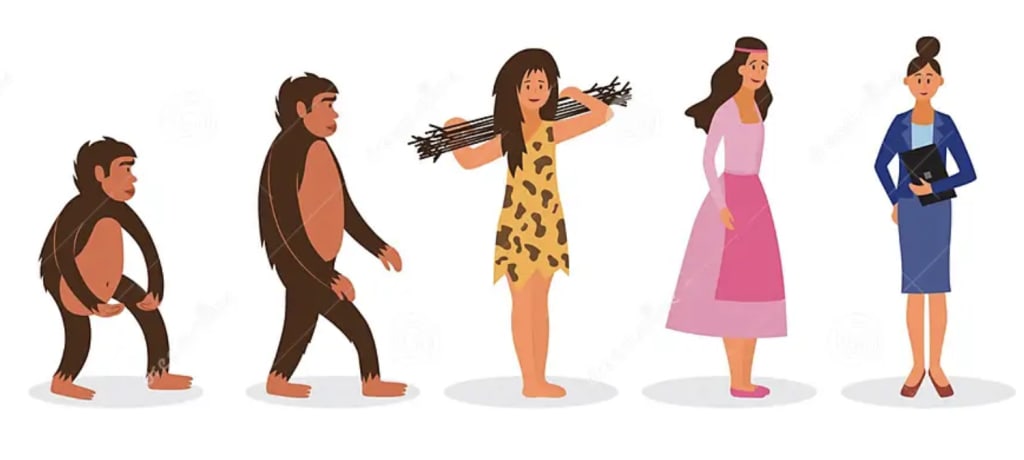Evolution of Women: From the Past to the Present
Tracing Women's Journey Through History: Struggles, Triumphs, and Ongoing Challenges

First of all, Women have shaped economies, cultures, and civilizations in important ways throughout history. The position and roles of women have changed significantly between ancient and modern societies. This article explores women's journeys from the past to the present, emphasizing significant turning points, difficulties, and successes. Ancient Times: Women's roles were mainly limited to household chores and childrearing in ancient civilizations including Mesopotamia, Egypt, and Greece. There were, nevertheless, a few outliers, with some women in influential and powerful roles. For example, Queen Hatshepsut and Egypt's Cleopatra VII are well known for their political and leadership abilities. Despite having little influence on public life, women in Greece were essential to household administration and religious activities.
Medieval Period: Women's rights were severely restricted during this time, especially in Europe. Women's servitude to men was fostered by patriarchal norms and feudalism, which kept them in subservient roles within the home and restricted their access to education and property ownership. Despite these limitations, women frequently performed vital roles in medieval civilization by helping with crafts, healthcare, and agriculture. During this time, the idea of chivalry developed, idealizing women as objects of respect and safety, albeit within the confines of rigid gender norms. The Renaissance and Enlightenment: The Renaissance was a time of great intellectual and cultural prosperity in Europe, characterized by a resurgence of interest in humanism and classical education.
Though women's access to school and public life remained restricted, the growth of literacy and the dissemination of ideas prepared the way for subsequent gains in women's rights. The Enlightenment, which promoted equality, liberty, and reason, further questioned prevailing gender standards. Philosophers like Mary Wollstonecraft laid the groundwork for later feminist movements by advocating for women's rights to political and educational engagement. The Industrial Revolution: Women's lives were significantly impacted by the enormous social and economic changes brought about by the Industrial Revolution. Women joined the labor in greater numbers as industrialization brought about the expansion of factories and metropolitan areas, especially in the textile and manufacturing sectors.
Though women's access to school and public life remained restricted, the growth of literacy and the dissemination of ideas prepared the way for subsequent gains in women's rights. The Enlightenment, which promoted equality, liberty, and reason, further questioned prevailing gender standards. Philosophers like Mary Wollstonecraft laid the groundwork for later feminist movements by advocating for women's rights to political and educational engagement. The Industrial Revolution: Women's lives were significantly impacted by the enormous social and economic changes brought about by the Industrial Revolution. Women joined the labor in greater numbers as industrialization brought about the expansion of factories and metropolitan areas, especially in the textile and manufacturing sectors.
Though women's access to school and public life remained restricted, the growth of literacy and the dissemination of ideas prepared the way for subsequent gains in women's rights. The Enlightenment, which promoted equality, liberty, and reason, further questioned prevailing gender standards. Philosophers like Mary Wollstonecraft laid the groundwork for later feminist movements by advocating for women's rights to political and educational engagement. The Industrial Revolution: Women's lives were significantly impacted by the enormous social and economic changes brought about by the Industrial Revolution. Women joined the labor in greater numbers as industrialization brought about the expansion of factories and metropolitan areas, especially in the textile and manufacturing sectors.
Modern Challenges and Achievements: Although women's rights and opportunities have advanced significantly, there are still issues in today's society. The challenges of gender-based violence, economic inequality, and underrepresentation in leadership positions continue to be critical. Still, in a number of industries and professions, including politics, science, business, and the arts, women are breaking down barriers and dispelling prejudices. Campaigns like the #MeToo movement have spurred discussions about gender equality and sexual harassment, leading to demands for responsibility and systemic reform.
In conclusion, women have exhibited resilience, tenacity, and endurance in the face of hardship throughout their history. Despite significant advancements, the fight for women's rights and gender equality is still ongoing. Through honoring and commemorating the historical accomplishments of women, we can motivate upcoming generations to carry on the struggle for a more just and inclusive society. Women have always been at the vanguard of social change, breaking societal norms and changing the course of history, from ancient matriarchal cultures to contemporary feminist movements. Let's reaffirm our dedication to justice for everyone and gender equality as we look to the future.





Comments
There are no comments for this story
Be the first to respond and start the conversation.